CINESUD, NON PROFIT DISTRIBUTION
We are a network of audiovisual broadcasting, led by a group of Latin American cineclubs under the sponsorship of the International Federation of Film Societies http://infoficc.wordpress.com
KAMRAN SHIRDEL. RETROSPECTIVE
Languages: Iraní. Subtitles in English, Portuguese & Spanish
Kamran Shirdel Biography
Kamran Shirdel (born in 1939) studied architecture, urbanism, design and film direction at the Centro Sperimentale di Cinematografia (CSC) in Rome. During his Roman studies he had the opportunity to have such great figures as Roberto Rossellini, Pier Paolo Pasolini, Nanni Loy, Francesco Rosi, Gillo Pontecorvo and many others as his direct teachers. His thesis film was a short called The Mirrors. During this time he also worked as an assistant on John Huston’s The Bible, which was then shooting at the famed Cinecitta studios.
After graduating in 1965, Shirdel returned to Tehran and started directing documentaries for the Ministry of Culture and Art. Over the next three years he directed his most renowned socio-political documentaries, six films that courageously and frankly revealed the darker side of Iran’s economic boom, analyzing the effects of a society of flush with oil money. These films were steeped in a deep social consciousness reminiscent of the best of the Italian Neo-realist tradition, the cinema that had influenced him deeply during his studies in Italy. Shirdel’s furious documentaries and cinematic language were a bone of contention both under the Shah and following his exile, because they spoke up for the underprivileged and, in doing so, exposed and criticized the corruption of the mechanism of power.
Because of the severe censorship, nearly all his films were banned and confiscated, and in the end he was expelled from The Ministry and put on the blacklist. Seven years after it was made (and censored), his The Epic of the Gorgani Village Boy (The Night It Rained!), after receiving the GRAN PRIX at The Third Tehran International Film Festival (1974), was immediately banned again and remained so (like his Nedamatgah (Women’s Prison, 1965), Qaleh (Women’s Quarter, 1966), Tehran Is the Capital of Iran (1966), and others) until after the revolution. His first (and, to date, only complete) feature film, The Morning of the Fourth Day (1972), a remake of Jean-Luc Godard’s A bout de souffle, won a few awards at the Sepas National Film Festival. Three years later his second feature film The Camera, based upon Nikolai Gogol’s «General Inspector,» was censored while still shooting and thus remains unfinished.
Shirdel, forbidden from pursuing his interest in observing and analyzing his society, was forced to turn his creative and technical talent to the making of a great number of commissioned and institutional films; a fertile production of highly praised industrial and educational films.
Kamran Shirdel is considered a father figure of Iran’s NEW cinema and documentary school of filmmaking. He paved the way for a type of social and critical documentary film in Iran that refused to be misused by presenting a politically documented and accurate reflection of reality.
Many famed Iranian cineastes, such as Abbas Kiarostami, Amir Naderi, Jafar Panahi, Rakhshan Banietemad, Mohammad Reza Aslani, Khosrow Masooumi, Mahvash Sheikholeslami, and Soudabeh Babagap, have been his pupils or worked directly with him during their formative years. Shirdel’s films are considered to be veritable references for the social documentary and filmmaking in Iran. His films have been widely shown in famous international film festivals and a series of retrospectives have been dedicated to him and his works (Moscow, Krakow, Leipzig, Florence, Paris, Lisbon, Berlin, Stuttgart, Montreal, Toronto, Beirut, Sicily, Rome, London, UCLA, Chicago, Locarno, etc.).
He has also served in selection committees and as a jury member in many international festivals in Iran and abroad. He has been awarded in many of these festivals either for his films or for his lifetime achievements, such as LIFETIME ACHIEVEMENT AWARD he received during the Lebanese DOCUDAYS in November of 2003.
Kamran Shirdel is the founder and director of FILMGRAFIC CO. and also KISH INTERNATIONAL DOCUMENTARY FILM FESTIVAL (KIDFF), the only independent documentary film festival in Iran.
The Night It Rained (a.k.a. The Epic of Gorgani Villager)
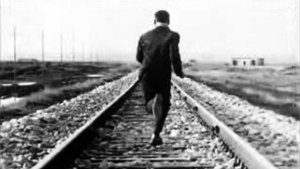 Conceived, Written and Directed by Kamran Shirdel.- Cameramen: Naghi Maasoumi, Kamran Shirdel.- Editing: Kamran Shirdel, Fati Dorostian.- Sound: Homayoun Pourmand.- Scripted Narration: Esmail Nouriala.- Narrator: Nosrat Karimi.- Produced by the Ministry of Culture and Art.- Running time: 35 min. B&W, 1967-74
Conceived, Written and Directed by Kamran Shirdel.- Cameramen: Naghi Maasoumi, Kamran Shirdel.- Editing: Kamran Shirdel, Fati Dorostian.- Sound: Homayoun Pourmand.- Scripted Narration: Esmail Nouriala.- Narrator: Nosrat Karimi.- Produced by the Ministry of Culture and Art.- Running time: 35 min. B&W, 1967-74
Synopsis: The Night It Rained is undoubtedly Kamran Shirdel’s best film and a masterpiece in the history of documentary filmmaking. In northern Iran, a schoolboy from a village near Gorgan is said to have discovered that the railway had been undermined and washed away by a flood. As the story goes, when he saw the approaching train, he set fire to his jacket, ran towards the train and averted a serious and fatal accident. Shirdel’s film does not concentrate on the heroic deed promulgated in the newspapers, but on a caricature of social and subtle political behavior – the way in which witnesses and officials manage to insert themselves into the research into this event. Shirdel uses newspaper articles and interviews with railway employees, the governor, the chief of police, the village teacher and pupils, each of whom tell a different version of the event. In the end, they all contradict each other, while the group of possible or self-appointed heroes constantly grows. With his cinematic sleights of hand, Shirdel paints a bittersweet picture of Iranian Society in which truth, rumor, and lie can no longer be distinguished.
After completion the film was harshly banned and confiscated, and Shirdel was expelled from the Ministry. It was released seven years later in 1974 to participate in the Third Tehran International Film Festival, where it won the GRAND PRIX by a unanimous vote, only to be banned again until after the revolution.
Tehran Is the Capital of Iran (Tehran Paitakhte Iran Ast)
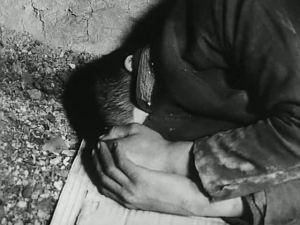 Written and Directed by Kamran Shirdel.- Cameraman: Mansour Yazdi,. Editing: Kamran Shirdel, Kazem Rajinia.- Produced by the Ministry of Culture and Art.- Running Time: 18 min., 23 sec. B&W, 1966-79
Written and Directed by Kamran Shirdel.- Cameraman: Mansour Yazdi,. Editing: Kamran Shirdel, Kazem Rajinia.- Produced by the Ministry of Culture and Art.- Running Time: 18 min., 23 sec. B&W, 1966-79
Synopsis: Tehran Is the Capital of Iran (1966-79) documents life in a deprived district in the south of Tehran. The images of destitution in Tehran’s poor areas is accompanied by a variety of spoken accounts: the official viewpoint on the district’s living conditions, what the inhabitants have to say, and occasional extracts read out of school manuals. The key element in Shirdel’s film is the counterpoint effect he creates with image and sound. His impressively powerful portrayal of social unease helps reinforce the impact of his astonishing documentary images and social themes.
The Women’s Quarter (Qaleh, a.k.a. The Red Light District)
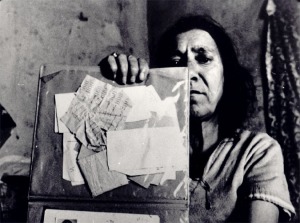 Written and Directed by Kamran Shirdel.- Cameramen: Kamran Shirdel, Mansour Yazdi.- Editing: Kamran Shirdel.- Stills: Kaveh Golestan.- Produced by the Ministry of Culture and Art.- Running Time: 18 min., 23 sec..- B&W, 1966-80
Written and Directed by Kamran Shirdel.- Cameramen: Kamran Shirdel, Mansour Yazdi.- Editing: Kamran Shirdel.- Stills: Kaveh Golestan.- Produced by the Ministry of Culture and Art.- Running Time: 18 min., 23 sec..- B&W, 1966-80
Synopsis:The deeply moving Qaleh – The Women’s Quarter (1966) shows the life of prostitutes in Tehran’s city brothels, an area known as Shahre Now. The film closely follows a number of women and communicates how the burden of social constraints led them to surrender in the face of their common fate. By including photos in the film, a very unique and artistic approach that brings to mind Chris Marker’s classic La Jeteé, Shirdel not only tempers the subject’s emotional heaviness but also respects the individual’s privacy, two pitfalls that often afflict films that deal with themes of this nature. The film does explore the possibility of re-education and development for these women, but in no way does it paint over the hard and brutal reality. As the film closes, a magnificent scene shot in slow motion leaves us with the memory of this ugliness forever imprinted in our minds.
The film was produced on behalf of the Organization of Iranian Women and was immediately banned while shooting was still going on. After the revolution, a portion of the material was found, and Shirdel decided to finish the film using photos by the late Kaveh Golestan that were taken more than ten years after the film itself was shot.
Screened in Moscow, Krakow, Warsaw, Prague, Dehli, Bombay, Paris, Berlin, Dusseldorf, Reggio Calabria, Rome, Montreal, Lisbon, Matera, Helsinki, Leipzig, Beirut, Dubai, Doha, Chicago, UCLA, and others.
Awards:
- Diploma of Honor (Moscow International Film Festival, 1980)
- Fipresci Award (Krakow International Film Festival, 1980)
- Best Documentary Award (Milad Film Festival, Iran, 1980)
Women’s Prison (Nedamatgah)
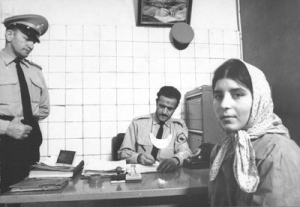 Written and Directed by Kamran Shirdel.- Cameraman: Maziar Partow.- Editing: Kamran Shirdel, Kazem Rajinia.- Narration: Asadollah Payman.- Produced by the Ministry of Culture and Art .- Running Time: 10 min., 38 sec..- B&W, 1965
Written and Directed by Kamran Shirdel.- Cameraman: Maziar Partow.- Editing: Kamran Shirdel, Kazem Rajinia.- Narration: Asadollah Payman.- Produced by the Ministry of Culture and Art .- Running Time: 10 min., 38 sec..- B&W, 1965
Synopsis: Women’s Prison recounts the life of the prisoners and the problems their families encounter in their struggle to survive. Here again filmmaker Kamran Shirdel employs the cinema verité style. The interviews with the prisoners, social workers and teachers serve as commentaries for «constructed» documentary images.
The technical process shows the extent to which solving social problems depends on everyone’s cooperation and participation. Certainly prisoners alone cannot offer the remedy to the entire catalog of social ills that propel these women into delinquency.

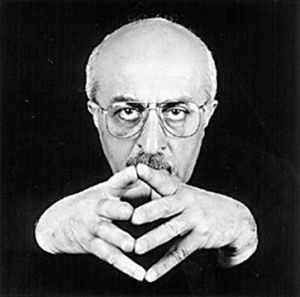






…muy interesante…